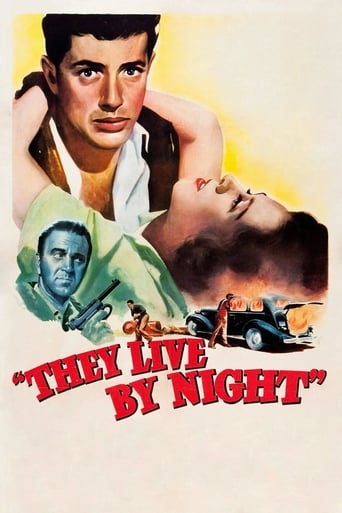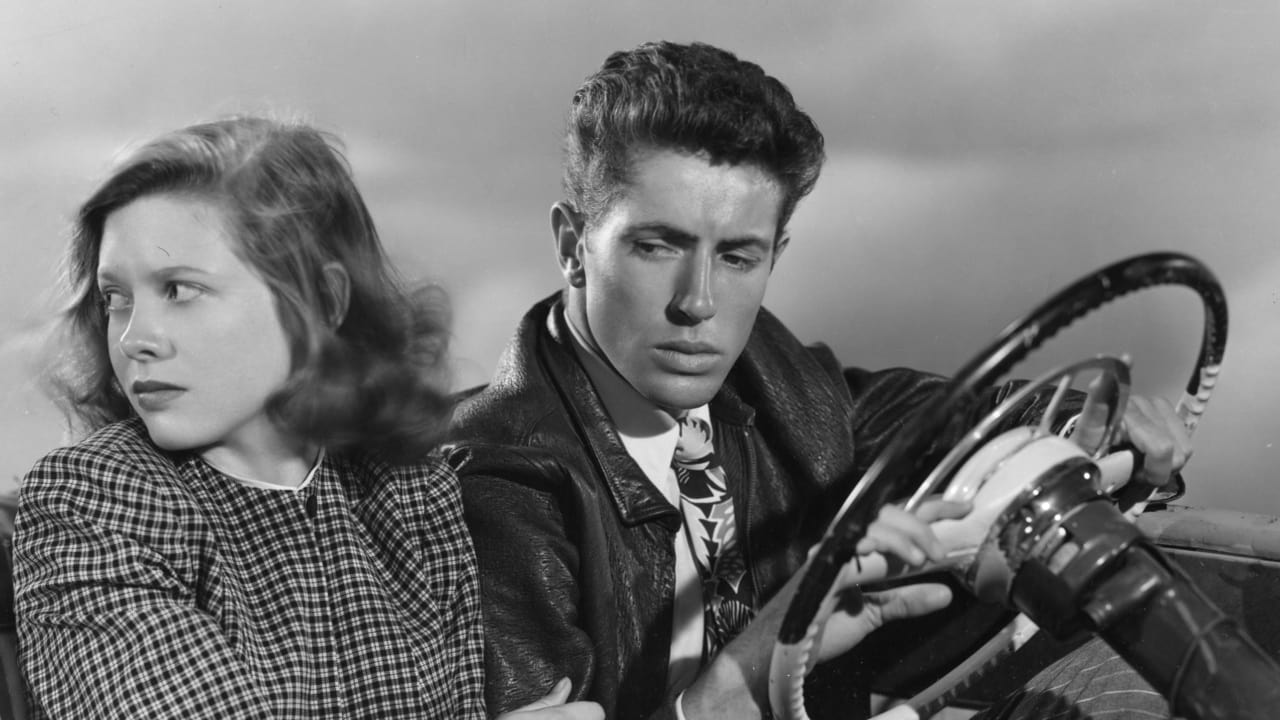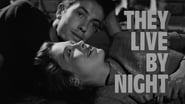Dan Franzen (dfranzen70)
In Nicholas Ray's seminal crime drama They Live by Night, injured bank robber Bowie (Farley Granger) falls for the independent young rancher's daughter Keechie (Cathy O'Donnell), and the two use Bowie's ill-gotten gains to distance themselves from the authorities and the rest of Bowie's gang.Bowie is the gang's wheelman, and when he's injured during a getaway, it's his newfound companion Keechie who gets to nurse him back to health while the others - Chickamaw (Howard da Silva) and T-Dub (Jay C. Flippen) - make themselves scarce. Keechie doesn't think much of her patient and his lifestyle. And make no mistake, Bowie feels little shame in his role, which has included murder. No bright-eyed neophyte, he. But there's something about Keechie, her deliberate movements, her slinky smile, that really appeals to Bowie, and the two slowly fall for each other.The first shot by Ray (in his directorial debut) is an early helicopter angle, as the bad boys speed down a rural road as they escape from jail. In fact, it's the first helicopter action shot, as previous uses of the vehicle were simply to shoot landscapes to set a scene. In any event, a tire is blown and the gang heads toward a farmhouse, where they meet farmer Mobley (Will Wright) and his daughter Keechie. There's chemistry just dripping between Granger and O'Donnell; both seem more naive than they truly are, and although each pretends to dislike the other, it's not long before them old hormones come a-knocking, although not too much, because this is 1948, after all, and the movie's set some 15 years earlier. On the run they go! Ray's first feature is strikingly shot. Aside from that iconic opening helicopter shot, there's also a great little scene of the gang pulling off a job - from Bowie's perspective as the driver. A bystander tries to engage Bowie in conversation just as T-Dub and Chickamaw run out of the building, earning him a rough shove to the face. That's noir film for you. Watch your face! O'Donnell and Granger work very well together (no surprise, since the latter recommended the former for the role), although I think most of the appeal comes from O'Donnell, who turns in a graceful, passionate, and unique performance as the trusting Keechie. Granger, appearing in only his third film (with Rope on the horizon) was never really that good of an actor, and so many of his lines are delivered in an almost nonchalant monotone that you wonder if some lessons weren't in his immediate future. At least no one can accuse him of hamming it up.And do you know who produced this masterpiece? None other than the great John Houseman, who most of us remember from his old Smith-Barney commercials but who was also one of Orson Welles' Mercury Theatre performers back in the day. The man knew talent, and he picked Nicholas Ray to direct without input from the studio. It's to Houseman's credit that the movie's as good as it is - which is to say, a true noir classic. There may not be a Bonnie and Clyde ending, but we're not talking about a Disney finale, either. Bonus cameo - the jeweler who sells Bowie a watch is played by none other than Will Lee. Yes, the same Will Lee who would go on to play Mr. Hooper on Sesame Street.
seymourblack-1
A brief but memorable shot at the very beginning of Nicholas Ray's "They Live By Night" shows two young lovers in a few shared moments of contentment that seem incredibly intimate, romantic and precious. It provides an arresting image primarily because of its skillful composition but also because of the way in which light and shadow are so cleverly used to create an atmosphere of warmth and tenderness. This shot is important not only because it emphasises that the young couple's love story is the main focus of the action that follows but also because it signifies that the first-time director's approach to filmmaking is significantly more subjective and empathetic than the majority of his contemporaries who were making film noirs during the same period.Bowie (Farley Granger) is a young man who was unjustly found guilty of murder and imprisoned at the age of sixteen. After having served seven years of his sentence, he takes the opportunity offered to him by two other inmates and together they escape from prison. When the car in which they're travelling develops a puncture, Chicamaw "One-Eye" Mobley (Howard Da Silva) and "T-Dub" Mansfield (Jay C Flippen) leave the injured Bowie behind and make their way on foot to Chicamaw's brother's cabin where they plan to hide out and they arrange for Chicamaw's teenage niece Keechie (Cathy O'Donnell) to use her father's vehicle to go and bring Bowie back to the cabin.The young couple are instantly attracted to each other but their relationship is initially awkward and tentative primarily because of their common naiveté but also because of Keechie's hostility towards the criminals. Bowie takes part in a bank robbery with the other two escapees because he thinks that by doing so; he can get enough money together to hire a lawyer who could prove that his original conviction was a miscarriage of justice.Following the robbery, Chicamaw and Bowie are involved in a car accident in which Bowie is injured and shortly after, Chicamaw shoots a police officer who arrives to check out what had happened. Chicamaw takes Bowie back to his brother's cabin where Keechie nurses him back to health and it's during this period that the couple fall deeply in love and decide to go on the run. Their dream of a normal life together is what drives them as they travel across country but their chances of success are constantly under threat.A striking feature of this movie is the way in which expressionistic cinematography, tight framing and close-ups are used to create an environment which looks closed in and oppressive. Everyone seems to be physically trapped by their surroundings and this is even true in the outdoor sequences as the use of aerial photography creates an impression that the people below are being watched and can't escape the scrutiny that they're under.Bowie and Keechie are both portrayed as being the products of their unfortunate backgrounds and people who are essentially good. Bowie never chose to follow a life of crime and his greatest ambition is to go straight. This being the case, it's fitting that he should be represented on screen by an actor who doesn't look like a stereotypical criminal and Farley Granger certainly meets this requirement. He gives a very credible performance as the misfit bank robber and Cathy O'Donnell steals the show as Keechie. Her skill in displaying the various characteristics of a girl who goes from being sullen and mistrustful to being rather warmer and more good humoured is both subtle and convincing.The best of the supporting performances comes from Howard Da Silva who is very threatening as a vicious career criminal. The entire cast is also particularly good and certainly adds another level of enjoyment to the movie by the ways in which the eccentricities and corrupt natures of the colourful characters are portrayed.
albertinamel
It seems the people who really enjoyed this flick as an example of noir are folks who focus a lot more on cinematography and film-making than the average viewer. (I don't know if the helicopter shots, for instance, were ground-breaking.) However, I can say that as simply a casual viewer who enjoys a good noir film, this one missed the mark. Is it noir or sappy romance? I felt like the director couldn't decide. The main actors seemed too baby-faced to carry off noir, imho, since the hardened characters in noir plots usually need to be a little bit more mature to have gained their worldly experiences. When compared with films like "Double Indemnity" and "Touch of Evil," "They Live by Night" just can't hold its own. Unless you're a total noir buff, I'd skip this one. There's even an old Nancy Davis (Reagan) film called "Shadow on the Wall" that few people have seen that I liked better than this one, fwiw.
tieman64
A couple fall in love, rob banks, go on the run and die in a hail of gunfire. Sound familiar? "Bonnie and Clyde", "You Only Live Once", "The Getaway", "Badlands", "Person's in Hiding" and "Thieves Like Us" all cover this material in a much more substantial way.What's interesting about "They Live By Night", though, is the way in which the film offers a template against which Altman's "Thieves Like Us" can be read.Altman's film uses "They live by Night" as a springboard to deconstruct the entire "couple on the run" gangster genre. Comparing the first shot of both films is useful in demonstrating Altman's work methods. "They Live by Night" begins with a car racing speedily down a road, a helicopter mounted camera tracking it as it moves. In contrast, "Thieves Like Us" begins with a fixed tripod mounted camera tracking a small boat as it glides lazily across a lake. Reversals like this occur throughout Altman's film on an almost scene by scene basis, the director using irony and humour to force his audience into the position of meditating upon genre rules and expectations.6/10 - This was Nicholas Ray's first film as a director. It's a good film, and in many ways laid the foundations for the "couple on the run" genre, but when viewed alongside such fare as "Badlands", "Gun Crazy" and "Thieves Like Us", the film is positively archaic.Note: this was one of the first films to make extensive use of helicopter shots.


 AD
AD






